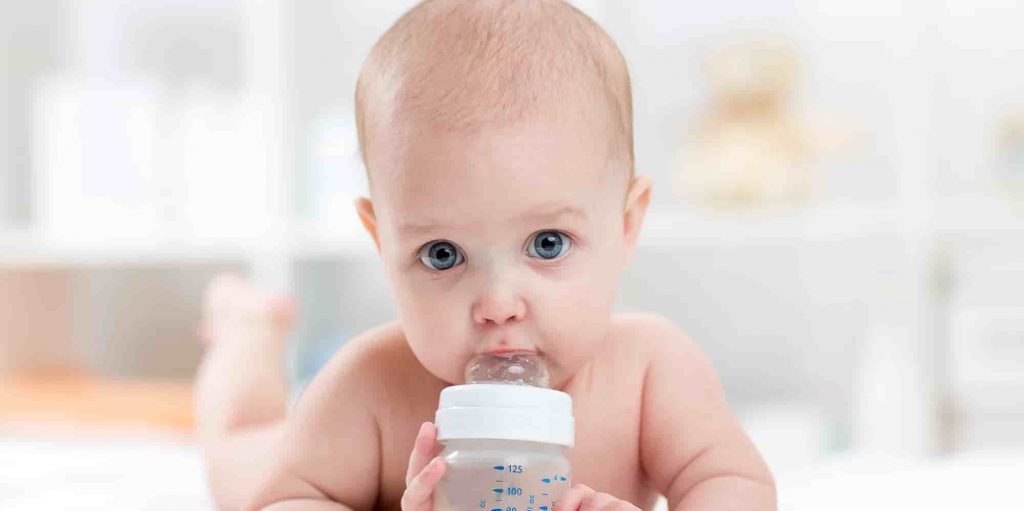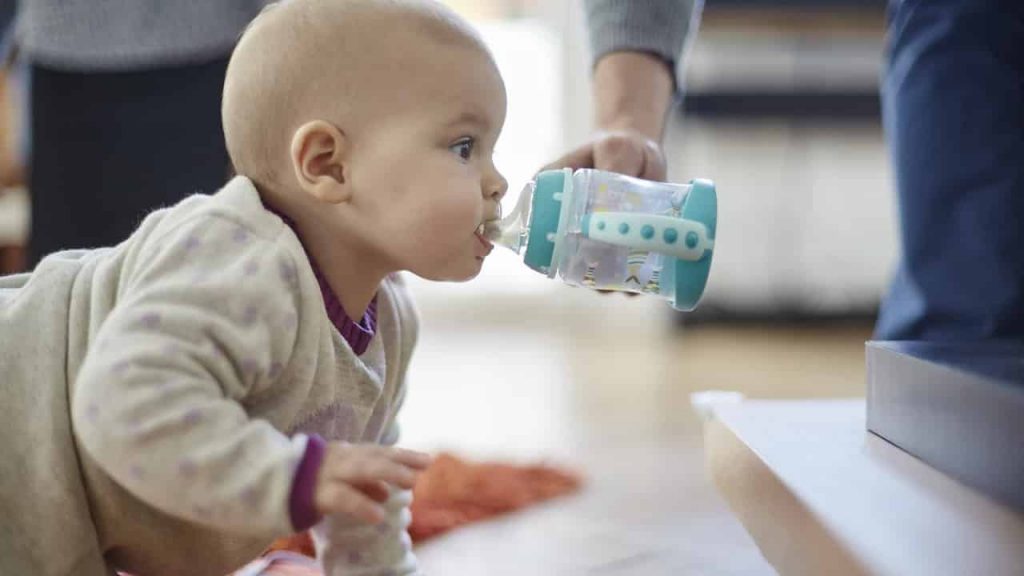When Can Babies Have Water?
One of the most curious and researched issues of new mothers is when to give water to babies.
Mothers who wonder when to give water to their newborn baby are looking for satisfactory answers and expert opinions on this subject.
The information published in this article is for informational purposes only. Remember that your best advice will be given by doctors who specialize in pregnancy.
So, When Can Babies Have Water?

What Will We Learn?
When Can Babies Have Water?
Pediatricians specifically state that in the first 6 months, the baby should be fed only breast milk or infant formula, without even giving water.
In the first 6 months, if water is given in addition to formula or breast milk, the baby’s feeling of thirst will decrease.
This will cause the baby to take formula or breast milk less, which will cause growth retardation due to insufficient energy intake.
The period in which babies will be given water regularly is the period when additional food consumption is realized.
Because as the amount of food eaten increases and the consistency becomes firmer, the baby’s need for fluid will increase.
At this point, the healthiest way to meet the baby’s fluid needs is water.
One of the most important points you should pay attention to is the quality of the water you will give your baby.
Water must be clean and healthy.
Mothers and fathers should choose the water they will drink their babies with great care.
Also, care should be taken that the water given during this period is not excessive.
How Much Water Should Babies Be Given?
The amount of water the baby needs varies according to age, on average between 100-150 ml per kg.
You can tell if your baby is getting enough fluids by watching his urine.
During infancy, 5-6 wet diapers a day, and after 2 years of age 4-5 times urination is an indication that your baby is getting enough fluid.
It is a big mistake to give sugary water or fruit juice instead of water to make babies love water.
This mistake can lead to problems such as childhood obesity in babies in the future.
The cleanliness of the water used and the electrolyte load it contains are important.
In any case, it is necessary to make sure that the water is clean and germ-free.
The water that the baby will drink should be ‘low mineral water’ specially produced for babies.
Low-sodium waters should be preferred for infants, especially during the first 6 months, for kidney functions that have not yet developed, both when preparing formula and after 6 months.
The odor and taste of the water should be neutral.
Since the first developing senses are smell and taste, the water used should not change the taste of the food and should not create a bad taste perception in the baby as drinking water.
It is also important that the water does not stay in the sun.

What Does Water Do To Your Baby’s Body?
- It ensures the digestion, absorption and transport of the edible nutrients to the cells.
- It is necessary for the functioning of cells, tissues, organs and systems.
- It helps in the transport and disposal of harmful substances.
- It provides control of body temperature through sweating.
- It also ensures that the baby stays at a healthy weight, improves concentration and reduces the risk of chronic diseases.
- It reduces constipation, urinary tract inflammation, diarrhea, etc. problems.
Drinking plenty of fluids is very important in frequent and watery stools, vomiting, febrile illnesses, colds, flu, and infectious diseases.
You can tell that your baby is losing water by the darkening of the urine color, the lack of wetness in the diaper or by changing less diapers.
If the fluid lost in the early period is not met by mouth with liquid drinks, after a while, a condition called ‘dehydration’ develops in the body.
This is the decrease in body water and the emergence of related symptoms.
Common Mistakes And Things To Watch Out For
The most important danger in giving water while breastfeeding for the first 6 months is infections.
The most common infectious disease in infants is oral fungi.
Cleaning the breast milk left in the baby’s mouth with water after breastfeeding is one of the mistakes made by many mothers.
Breast milk forms a protective layer in the mouth and protects the baby against oral infections.
When the mouth is cleaned with water, we leave the baby unprotected against dangerous germs from the outside.
While preparing formula for babies who cannot take breast milk, it is necessary to boil the water for 10 minutes and cool it, that is to sterilize it, in the period up to 6 and 8 months when the baby’s first vaccinations are finished.

Should You Boil Tap Water?
Information on the quality and safety of the water where you live should be clarified with the relevant organizations.
Also, your pediatrician will likely tell you how to give your baby water or not.
If the quality of the tap water is not satisfactory, you can also use bottled water.
- Boil the water for 1 minute
- Remove from heat and let cool to room temperature (approximately 30 minutes).
Before giving your baby water, check its temperature by dropping it on your wrist.
What Is Water Poisoning In Babies?
Now that we got the answer to the question of When Can Babies Have Water, let’s take a look at what we can do in case of poisoning.
Water intoxication or hyponatremia is a condition in which the sodium level in the blood drops critically.
Too much water intake can cause this condition.
If you give water to a child under 6 months old, there is a risk of developing water intoxication.
Symptoms of hyponatremia may include:
- nausea and vomiting
- headache
- drowsiness
- irritability
- contractions
Water intoxication is a medical emergency and treatment may include intravenous administration of electrolytes or other medications.
Contact your doctor if you notice any of the symptoms listed above or have questions or concerns about aquatic toxicity.
Although drinking water seems like a completely harmless liquid, it is not recommended for children under 6 months of age.
Until this age, the baby receives all necessary nutrients and fluids through breast milk or formula.
We have come to the end of our article titled When Can Babies Have Water.
If you are a pregnant candidate, if you have ideas that may be useful to other pregnant women, you can write these ideas in the comments section.
Result
You shouldn’t give your baby water for the first 6 months, but even after 6 months, drinking too much water can be dangerous.
It is okay to give small amounts of water to babies after 6 months.
Young babies may not drink water for the first 6 months as they get the required amount of water from breast milk or formula.
For this reason, be careful not to give your baby an extra water for the first 6 months.
It’s a good idea to familiarize your baby with a sippy cup starting at 6 months.
The American Academy of Pediatrics warns expectant mothers that you can give water to babies after 6 months.
You can give a water from a cup of chilled boiled tap water to breastfed and formula-fed babies from six months of age.
It’s a good idea to get your baby used to drinking from a cup (After 6 months!).
Once babies start eating solid food, they can start to take a sips of water.
Adding too little water to baby food can also put strain on the digestive system and kidneys.
Also, adding too much water to the food dilutes the formula.
Diluted formula provides insufficient nutrients and calories, which may not be good for your baby’s health.
In hot weather, be careful not to dress them too thickly so that your babies do not get very thirsty.
A small note: Not all formula feeds are good for babies, so make sure you research well when choosing.
If you have any questions, talk to your doctor for medical advice.
You’ll also like our article, Frequently Asked Questions And Answers About Pregnancy.
